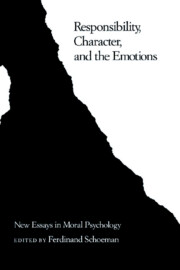Book contents
- Frontmatter
- Contents
- List of Contributors
- Acknowledgments
- 1 Introduction
- Part I Responsibility and Character
- Part II Responsibility and Culpability
- 8 The Moral Worth of Retribution
- 9 Nonmoral Guilt
- 10 Provocation and Culpability
- 11 Responsibility and the Limits of Evil: Variations on a Strawsonian Theme
- 12 Statistical Norms and Moral Attributions
- 13 Guilt, Punishment, and Desert
- 14 Intention, Foreseeability, and Responsibility
- Index of Names
9 - Nonmoral Guilt
Published online by Cambridge University Press: 03 February 2010
- Frontmatter
- Contents
- List of Contributors
- Acknowledgments
- 1 Introduction
- Part I Responsibility and Character
- Part II Responsibility and Culpability
- 8 The Moral Worth of Retribution
- 9 Nonmoral Guilt
- 10 Provocation and Culpability
- 11 Responsibility and the Limits of Evil: Variations on a Strawsonian Theme
- 12 Statistical Norms and Moral Attributions
- 13 Guilt, Punishment, and Desert
- 14 Intention, Foreseeability, and Responsibility
- Index of Names
Summary
Most of us share the belief that we sometimes are and sometimes are not guilty. To deny it would seem to flout common sense. But, of course, philosophers have done precisely this. They have offered arguments to demonstrate the radical view that none of us is, or indeed ever could be, guilty – arguments, for example, that cast doubt upon our ever possessing free choice or our having an identity that extends over time. Were we to take seriously such views, the appropriateness, even rationality, of our ever feeling guilty would also be thrown into doubt, for this feeling generally arises because of a belief in one's guilt.
A shared assumption appears to underlie the opposing views of common sense and these philosophers. Guilt requires “culpable responsibility for wrongdoing.” Thus, if one lacked free choice or if one acted under a reasonable mistake of fact or if another, not oneself, were responsible for wrongdoing, one would not be guilty. Common sense proceeds on the assumption the requirement is sometimes satisfied; the philosophers dispute it.
From the fact that we defeat attributions of guilt by citing absence of culpability, it is easy to conclude that the criteria for guilt, summarized by the phrase “culpable responsibility for wrongdoing,” impose constraints (I call them “moral constraints”) on the concept's application. Failure to satisfy these constraints implies absence of moral guilt, which is then assumed to be the only genuine guilt (apart from a formal concept of guilt such as we find in law). On this view, which I take to be commonly held, one's feeling guilty, despite one's not being guilty, would be inappropriate.
- Type
- Chapter
- Information
- Responsibility, Character, and the EmotionsNew Essays in Moral Psychology, pp. 220 - 240Publisher: Cambridge University PressPrint publication year: 1988
- 30
- Cited by

